French MP Says Efforts Underway To Designate IRGC
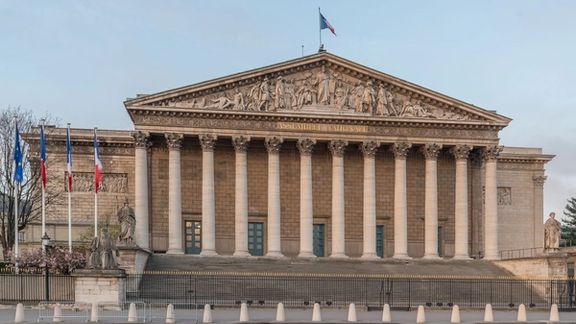
A member of the French parliament claims efforts have begun to vote for designation of the Islamic Revolutionary Guard Corps.

A member of the French parliament claims efforts have begun to vote for designation of the Islamic Revolutionary Guard Corps.
In an exclusive interview with the Persian Service of Radio Free Europe in Prague, Radio Farda this week, Éléonore Caroit stated that so far there were technical and judicial obstacles to proscribe the IRGC, but the preparations for the motion have already been made.
A group of lawyers including seven French and Iranian solicitors, said they have concluded with legal investigations that contradict EU Foreign Policy Chief Josep Borrell's claims that there are legal obstacles to designating the IRGC as a terrorist organization.
The group is now consulting with the French parliament and government to approve and implement the resolution.
On Sunday, Éléonore Caroit participated in a protest rally in Paris to condemn Europe’s relations with the ruling regime.
The European Parliament overwhelmingly passed a resolution in January calling on the EU and member states to designate Iran’s Revolutionary Guard as a terrorist group.
The resolution demanded that Iranian authorities end the crackdown on popular protests that started last September after 22-year-old Mahsa Amini was killed in morality police custody.
It also demanded that Europe sanction the Islamic Republic’s Supreme Leader Ali Khamenei and its president Ebrahim Raisi.
"It is something that cannot be decided without a court decision first. You cannot say I consider you a terrorist because I don't like you," Josep Borrell, the EU's high representative for foreign affairs, told reporters in Brussels.
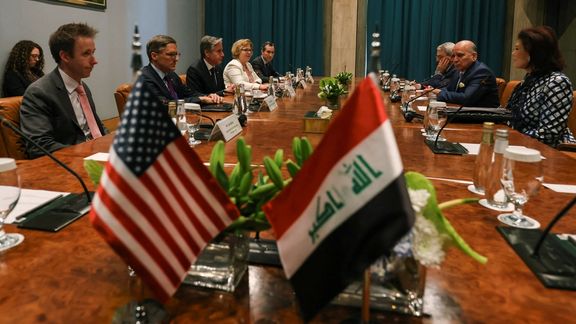
The United States is said to have given Iraq permission to pay $2.7 billion of its debts to Iran but the mechanism by which the money would be released remains murky.
Iraqi Foreign Minister Fuad Hussein was reportedly given the clearance during a meeting with US Secretary of State Antony Blinken on the sidelines of the Riyadh Conference on June 8, Reuters cited a senior Iraqi official, who spoke on condition of anonymity.
The Iraqi foreign ministry source said that the funds will be transferred through the Commercial Bank of Iraq and Iranian officials have confirmed that the money will be used for Iranian Hajj pilgrims' expenses and foodstuffs imported by Iran.
Iranian officials have claimed that the money in Iraqi banks could be as much as $10 billion or more. Yahya Al-e Eshaq, the head of the Iran-Iraq chamber of commerce, was quoted as saying by the local media Saturday that the Iraqi debt is between $7 to $8 billion but only $2.7b has been agreed to be released and that part of the funds has been earmarked for pilgrims and another portion has been used to purchase basic goods.
On Monday, Iranian lawmaker Hassan Norouzi claimed that the money will be provided to the Hajj pilgrims in forms of subsidies to buy dollars at a slightly lower rate than free market. However, he criticized the decision, saying that the money belongs to all Iranians and not a small number of affluent individuals, who can afford the Hajj pilgrimage in the first place.
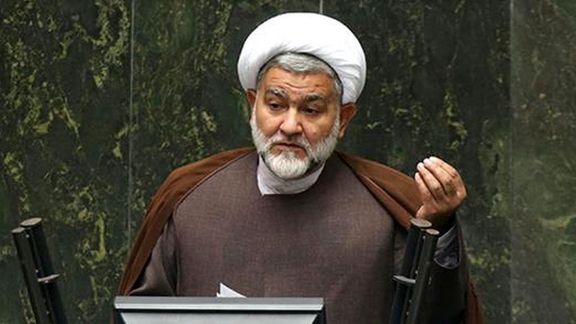
Norouzi, who is the vice-chairman of the Judicial and Legal Committee of the parliament, pointed to the country’s dire economic situation, calling the scheme "a definitely wrong move."
"This money belongs to the entire nation and should be spent for the sustainable goals of the Iranians,” he said. It is better “to spend the money on Tehran’s water, so that residents of the capital would not have to drink water contaminated by nitrate.”
The annual Islamic pilgrimage to Mecca, Saudi Arabia -- the holiest city for Muslims -- is a mandatory religious duty that must be carried out at least once in their lifetime by all adult Muslims who are physically and financially capable of undertaking the journey. This year Hajj ceremonies will be held around late June through early July and the average price for Iranians to go to the journey is about $5,000, a rate set by the host country Saudi Arabia.
The key condition for the pilgrimage is physical and financial ability of the applicants. If the government is supposed to subsidize the journey, then it is not a real pilgrimage.
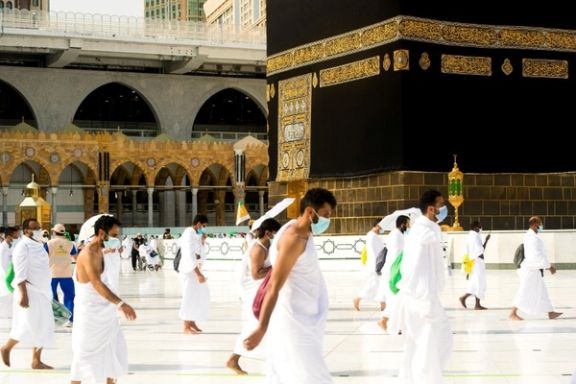
The Iranian government organizes and controls the Hajj pilgrimage, including paying Saudi Arabia in US dollars for the expenses of each traveler, and providing dollars to pilgrims to spend during their journey. But instead of charging each pilgrim the full amount based on high free market exchange rate, it provides these dollars at a low preferential rate, in effect subsidizing the pilgrimage.
However, the total amount of the subsidy would still be a tiny fraction of the $2.7 billion that is reportedly about to be unblocked, considering that the number of the pilgrims is at most 80,000 people. The total subsidy the government would spend on pilgrims this year will be around $200 million.
The question is how Iraq plans to release the $2.7 billion including whatever has been designated for pilgrims. Officials of all three countries are silent on the issue. If a few hundred million dollars is set aside for pilgrims, would it be transferred to Saudi Arabia as payment for expenses? Or cash dollars will be provided to the Iranian government, which would violate the purpose of US banking sanctions to begin with.
Multiple reports this week suggest the US is offering financial incentives to the Islamic Republic in exchange for Tehran slowing its production of enriched uranium. Late in May, Iran International ported that the United States was offering to release Iran’s funds held in Iraq and South Korea in exchange for Tehran to show more flexibility on issues related to its nuclear program, and the release of American dual nationals held hostage in Iran.
A week later, on June 7, Haaretz confirmed the report saying that the United States was offering to release $20 billion in frozen Iranian funds — currently held by South Korea, Iraq, and the International Monetary Fund — in exchange for Iran limiting further production of high-enriched uranium.
Another report on June 8 by Middle East Eye (MEE) echoed much of Haaretz’s reporting but added that the administration would allow Iran to export an additional one million barrels of oil per day, which would likely require the president to issue a national security waiver.
Iranian and American officials have rejected the reports, but – according to The Foundation for Defense of Democracies (FDD) -- questions remain about whether an agreement may proceed without official text or notification to Congress, as required under existing law.
The head of the FDD, Mark Dubowitz, says: “The Biden administration hopes that Tehran will be more amenable to a ‘longer and stronger’ deal after getting major nuclear and economic concessions in exchange for a ‘shorter and weaker’ arrangement. This is an illusion. Iranian leaders understand power and leverage better than President Biden and his team do. The emerging ‘less for more’ deal is the worst deal of all.”
“The administration may be looking to evade congressional review by trading billions of dollars to Iran in exchange for a temporary halt to higher levels of enrichment, all without a written agreement or public acknowledgment. Paying Iran to sit patiently on the nuclear threshold won’t stop Iran from developing nuclear weapons, but it will subsidize attacks against Americans, Israelis, Ukrainians, and Iranians," said Richard Goldberg, a senior advisor at the FDD.
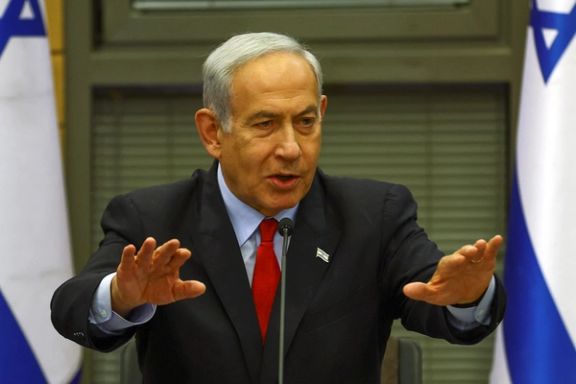
Israeli Prime Minister Benjamin Netanyahu has discussed the Iran threat with visiting Lithuanian Prime Minister Ingrida Simonyte.
An Iranian nuclear weapon would harm regional stability and threaten the entire world, Netanyahu told his counterpart on Monday.
The two sides also discussed expanding cooperation in innovation, cybertech, and artificial intelligence.
Back in May, Netanyahu said Iran is like "50 North Koreas," and if it could threaten every city in the US with nuclear extortion, it would change history.
“[Iran] is not merely a neighborhood bully, like the dynasty that rules North Korea. This is an ideological force that views us, Israel, as small Satan, and views you as the great Satan. And to have North Korea, or rather Iran, being able to threaten every city in the United States with nuclear blackmail, is a changing of history,” he added.
The prime minister made the remarks in a meeting with a bipartisan group led by US House Intelligence Committee Chairman Michael Turner.
Netanyahu told Iran International in March that Tehran is “dangerously moving forward” in its nuclear program and close to "red lines".
The issue of the Iranian regime’s nuclear program is “the quintessential heart of my foreign policy,” he said, adding, “I came back into government precisely to prevent Iran from becoming a nuclear state,” vowing to do “everything possible to prevent it."
Netanyahu indirectly referred to recent confirmation by the International Atomic Energy Agency (IAEA) that it found uranium particles enriched to 84-percent purity, which is very close to the 90-percent enriched fissile material needed for nuclear bombs. He said that Israel will not tolerate a “nuclear threshold” Iran.
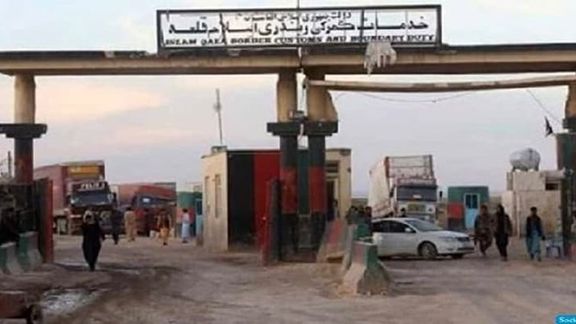
Over 100 Afghans serving prison sentences in Iran were handed over to the Taliban on Sunday.
“As a result of the efforts of the Ministry of Foreign Affairs… 101 Afghan prisoners were transferred again in Nimruz in connection with the agreement reached with the Islamic Republic of Iran,” said the Taliban’s Foreign Ministry on Monday.
Fazl Mohammad Haqqani, Chargé d'affaires of the Afghan Embassy in Tehran told Radio Farda, the Persian Service of Radio Free Europe in Prague that “250 to 260 more prisoners will be handed over to the Islamic Emirate at Islam Qala border on Wednesday.”
According to Haqqani, the prisoners were mostly incarcerated on charges of drug trafficking and fighting, but none of them were sentenced to death.
Human rights organizations had earlier announced at least six Afghan citizens were executed in Iranian prisons and some more have received the death penalty.
At least 457 Afghan prisoners were also handed over to Afghanistan by Iranian authorities back in March, amid deep concerns over the Taliban's human rights record.
Despite international pressure not to recognize Kabul's government, Tehran is handing over the inmates to the Taliban which may put their lives in danger.
Afghanistan's embassy was also handed over to the Taliban by Iran, provoking outrage among Afghans.
However, the tensions over the water share of Iran from the Helmand River have strained the ties between Tehran and the Taliban.
Iran has accused Afghanistan's Taliban of violating a 1973 treaty by restricting the flow of water from the river to Iran's parched eastern regions, an accusation denied by the Taliban.
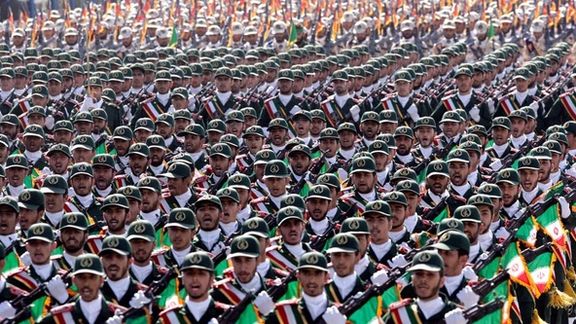
Iran’s exiled prince Reza Pahlavi citing a group of French-Iranian lawyers says there are no legal obstacles for the EU to sanction the Revolutionary Guard.
In a tweet on Sunday, Reza Pahlavi urged the European authorities to reconsider their current position and proscribe the IRGC as a terrorist group, based on a report the lawyers have presented to his office and heads of governments.
“Listing this entity, which is dedicated not to protecting Iran or Iranians but instead the power of the dictatorship, would be a strong and long-awaited recognition of reality and a show of support to my compatriots who are fighting for freedom and democracy in our country.”
Unlike the United States which in 2019 under former President Donald Trump put the IRGC on its Foreign Terrorist Organizations (FTO) list, European countries avoided the designation in the past few years and prioritized diplomacy with the Islamic Republic in the hope of concluding a nuclear deal.
Many politicians in France, Germany, and other European countries have been keen to pursue the IRGC’s designation by the EU and say that it has been long overdue. In January, the European Parliament approved a resolution with absolute majority to designate Iran’s Islamic Revolutionary Guard Corps (IRGC) as a terrorist organization. However, the EU refused to do so, with its Foreign Policy Chief Josep Borrell saying the move needs a ruling by a European court.
The document cited by Pahlavi refers to the Common Position adopted by the EU following the 9/11 attack, saying that the same definitions used to describe persons, groups and entities involved in that terrorist acts apply for the IRGC.
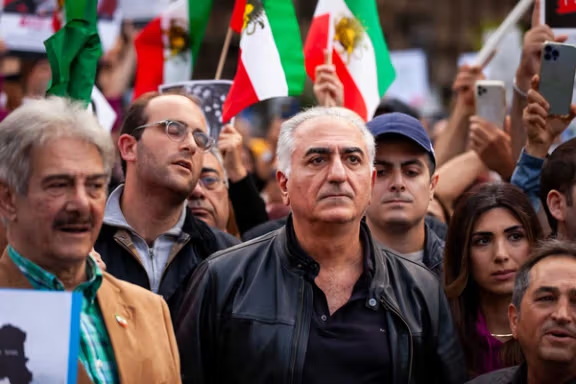
The legal report says a "terrorist act" shall mean any intentional act that may seriously damage a country or an international organization, seriously intimidating a population, or unduly compelling a government and seriously destabilizing or destroying the fundamental political, constitutional, economic or social structures of a country.
Having stated the statutes that provide the legal basis for listing an entity on the European list of terrorist organizations, the group of lawyers went on to provide examples of such acts by the IRGC to prove that the entity deserves to be designated, like all the other groups that the EU has blacklisted.
“The study of the IRGC confirms that it constitutes a structured organization which has carried out terrorist attacks and which has been the subject of decisions by competent authorities which the Council of the European Union could take into account in order to proceed with its inclusion on the European list of terrorist organizations,” read part of the document.
A noteworthy point in the document is the often-ignored duty of the IRGC according to the Islamic Republic’s Constitution: Exporting the revolution.
“The Constitution distinguishes the mission assigned to the IRGC to continue the Islamic Revolution, considering ultimately that the fall of the regime of the Shah of Iran and the establishment of the regime of the Islamic Republic do not constitute the end of the Islamic Revolution,” it reads, arguing that IRGC's mission to pursue the Islamic Revolution ideologically, beyond the borders of Iran may be among the main reasons behind its extra-territorial destabilizing activities.
Among the reasons that legally justifies the designation of the outfit, the document points out that the IRGC has planned and executed numerous operations aimed at assassinating Iranian opposition figures. “It also carried out attacks against foreign personalities and institutions that the Islamic Republic considered at the time as enemies or contrary to its interests,” added the document.
The documents also provided a long list of assassinations and terrorist acts tracing back to the IRGC as the cases that the EU can use to proscribe the group.
The cases include the assassination of Shapour Bakhtiar, the last prime minister of the Shah in 1991; assassination of Shahriar Shafiq, the nephew of the Shah of Iran, in 1979; the kidnapping of David Stuart Dodge, the president of the American University of Beirut, in 1982; attacks on the US Embassy and US Marines in Beirut in 1983; wave of attacks in Paris, 1985 and 1986; the Mykonos restaurant assassinations in 1992; and attack on AMIA in Argentina in 1994; as well as recent plots, such as the attempted assassination of John Bolton in 2022 and attempted assassination of opposition figure Masih Alinejad.
A presupposition prevailing throughout the text is that the European Union seeks to designate the IRGC and only lacks the proper legal bases, as proclaimed by Borrell. However, it seems that the reluctance to blacklist the IRGC is based on political reasons.
Talks in Vienna to revive the 2015 JCPOA nuclear deal came to an abrupt stop in 2022, reportedly for Iran’s insistence that the IRGC be removed from the US FTO list.
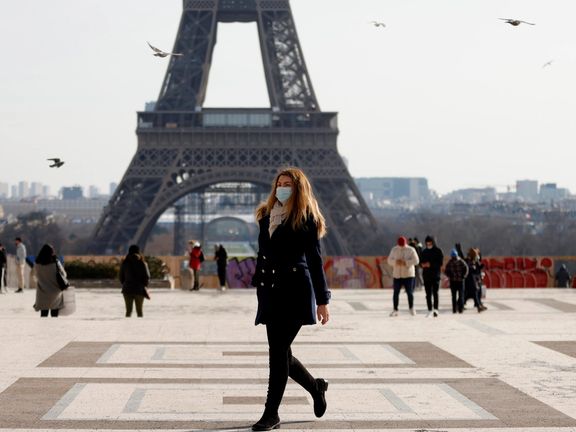
The Albania-based opposition group Mojahedin-e-Khalq (MEK) has accused the Islamic Republic of a terror attack on its building north of Paris.
In a statement the group claimed a building belonging to its supporters in the city of Saint-Ouen-l'Aumône was attacked by “terrorists and mercenaries of the IRGC Quds Force and the ministry of intelligence” who were speaking Farsi.
“Two terrorists threw incendiary devices towards the entrance of the building, but as soon as they were chased by the residents, they quickly fled the area in a car that was ready on the street,” read the statement.
The MEK further added that the fire at the entrance was extinguished quickly, and no one was injured, but police started investigations.
Earlier on May 31, the same place was targeted by six bullets, but no one was hit, according to the statement.
The group added that the recent release of Asadollah Asadi, an Iranian agent disguised as a diplomat in Europe who was convicted in a Belgian court for a terror plot in France in 2018, has made the regime more “audacious” to stage terrorist acts.
It also called on the French government, police, and judiciary to arrest the perpetrators of such criminal acts of terrorism and prosecute them and publish all the details to inform the public opinion.
A week ago, Olivier Vandecasteele, a Belgian aid worker detained in Iran, returned to his country in exchange for the release of Assadollah Asadi.